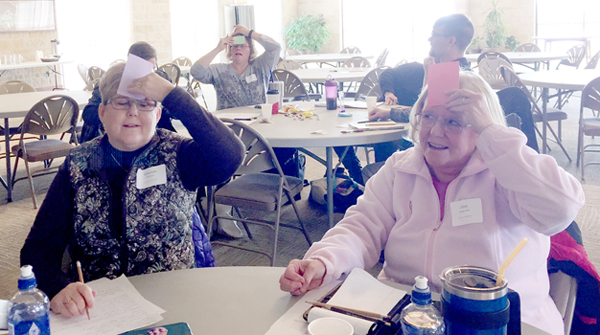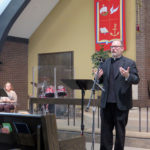
Rhonda Elskamp, left, and Jane Bergendahl of St. Ann Parish-Long Grove participate in an activity designed to help typical adults understand obstacles that people with disabilities face. The diocesan workshop was held in November at St. Patrick Parish-Iowa City.
By Barb Arland-Fye
The Catholic Messenger
IOWA CITY — Faith formation leaders participating in a workshop on effective catechesis for persons with disabilities separated into two groups, each assigned to hide an object from their colleague, Andrew Schwartz, who waited outside the room. One group hid a Bible inside a piano seat. The other group hid a pair of scissors by taping it underneath a table.
Workshop presenter Tom Racunas chose the exercise to “test” participants’ ability to communicate effectively, but with an obstacle. Participants were limited to two words — “hot” and “cold” — to provide clues to Schwartz’s search for the missing objects. “Hot,” one group shouted in unison. “Cold,” the other group shouted in unison. The shouting continued as Schwartz walked in confusion through the room. By the end of the exercise, he felt frustration because of the mixed signals and lack of clear directions.
Schwartz understood the classic children’s game — Hot/cold — but this version had a twist. At one point, he chose to tune out one group and listen to the other. “I wasn’t really getting what they (the scissors group) wanted, so I decided to listen to someone else.” Finally, he found the Bible inside the piano seat.
The exercise was a microcosm of the experience of children and adults with special needs, Racunas told the participants gathered last November at St. Patrick Parish in Iowa City. “Our mission is to grow as disciples of Jesus, to make disciples for Jesus. But we have competing forces working against us — inside and outside the church.”
Racunas, lead consultant for Special Needs Ministry for the Archdiocese of Kansas City in Kansas, said that all people can grow in holiness and should be recognized for their gifts, including people with a disability of some sort. Workshop participants brainstormed a definition of “disability.” They came up with: “Anything which inhibits a person’s ability to learn or perform based on societal norms and/or expectations; a roadblock to integration in society (or church).”
The term “disability” covers a broad sweep of challenges: mental illness, intellectual/cognitive challenges, autism, diabetes, cancer, obesity, drug dependency, cystic fibrosis, heart disease, cancer, deaf/hearing impaired, physical challenges and more, Racunas said.
Thirty percent of all U.S. families have a family member with a disability, he continued. And 1.9 million people incur a traumatic brain injury annually. Six million individuals share a label of developmental disability. One family in five is impacted by the mental illness of a loved one. One in four individuals has a diagnosable mental illness in a given year; 17 percent of those are diagnosed with severe or persistent mental illness.
“We are all disabled in some ways or we could be,” Racunas said. “It’s a natural part of the human condition.” Eighty-five percent of disabilities are caused by accident or illness, he added. “If I become disabled, I still want to be a part of the eucharistic table. I want to be a part of the faith community. If that’s what I want for myself, that’s what I should want for others.”
He cited the U.S. Conference of Catholic Bishops’ 1978 Pastoral Statement on People with Disabilities, which states that integration “into the Christian community may require nothing more than issuing an invitation and pursuing it. For others, full participation can only come about if the Church exerts itself to devise innovative programs and techniques” (No. 14).
The workshop’s afternoon session focused on ideas to consider in developing ministry to people with disabilities. Be persistent, vigilant. It’s going to be frustrating and it will take time, Racunas advised.
Some ideas:
• Start with greeters at church. For people with mobility issues, go to their car and help them inside the church. Have an umbrella brigade. Think about what else can be done to increase hospitality in parishes.
• During Autism Awareness Month (April), place informational prayer cards in the pew. The National Catholic Partnership on Disability (NCPD) is an excellent resource for raising awareness on a variety of disabilities.
• Look at the behavior, not the disability. Ask: What can I do to help your child succeed? Does your child need any accommodations to be successful and safe?
• Faith formation should have a universal design with flexible learning environments that can accommodate individual learning differences.
The workshop “reminded each participant of the widespread nature of what can be considered special needs and that we must always focus on the various abilities one has, not the ‘disability’ or limitation that we might initially see,” said Rosina Hendrickson. She serves as the Diocese of Davenport’s Lifelong Faith and Lay Ministry Formation coordinator.
“Ministry to persons with disabilities must be individualized and focus on their strengths. The Office of Faith Formation is committed to partnering with parishes and individual families to help all people within the diocese feel welcomed and accepted in our parishes,” Hendrickson said. “This workshop was a first step in this partnership. We encourage parishes and families to contact us with questions and concerns as we move forward in developing this ministry area.”
Visit the newly created website on Special Needs ministry at https://www.davenportdiocese.org/ff-sn.
Workshop energizes participants
Retired special education teachers Jane Bergendahl and Nancy Shannon attended the workshop on effective catechesis for persons with disabilities because they lead Special Faith Saturdays at St. Ann Parish in Long Grove. “This was probably the best in-service we’ve been to,” Bergendahl said. The presenter provided excellent “hands-on ideas for inclusion of special-education students in regular faith formation. It should have been attended by every faith formation director in the diocese.”
Bergendahl especially appreciated ideas for curriculum adaptations because that is something she and Shannon provide at the monthly Special Faith Saturdays sessions. “One of the best examples is the prayers of the faithful. We take the ones that have been written for the weekend and we adapt them so the main meaning is able to be expressed in just a few words by participants,” Bergendahl said. Participants also serve as ushers and present the gifts for Communion. They distribute parish bulletins after Mass. One serves as a lector.
The workshop reaffirmed “that we’re working in the right direction,” Shannon said. “We’re giving the people in our parish the opportunity to see what some of our special needs persons can do in their service to our church.”
Andrew Schwartz, the volunteer in the workshop’s first exercise, said the workshop provided a good start for him on building awareness about special needs catechesis. He serves as K-8 coordinator at Sacred Heart Parish in Newton. He’d like to see a follow-up workshop “to be effective, to keep things moving” in the implementation of special needs catechesis.
Shannon Duffy, director of faith formation for St. Thomas More Parish in Coralville, said he was drawn to the workshop “because I needed better formation in this area. We have students who have special needs.”
Duffy sees more students with special needs or circumstances that need to be addressed and he wants to know how to accompany them on this journey. His take-away from the workshop was a greater awareness of the different needs and how to be more sensitive to those needs. He’d like to see future workshops that provide practical ideas. “I’m trying to be a better resource for my catechists working in the classroom with the children with special needs.”











